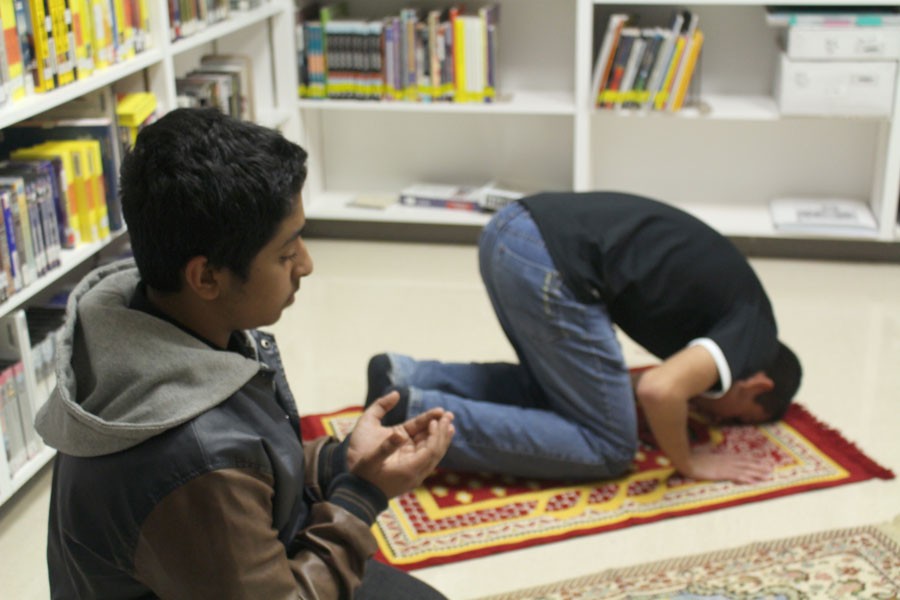Prayer room provides freedom of religion
Muslim students are given opprotunities to pray during the day without prevention
Freshman Mohommad Suleman Motiwala and Senior Mohammad Abdul- jabbar pray Namaz facing the Qibla which is the focal point towards the Kaaba in Mecca. Abduljabbar is in the bowing position while Motiwala is finishing the prayer off with wishes he wants to be accepted by God.
February 9, 2016
Being a cyclical part of every Muslim’s day, prayer keeps them in touch with their faith. With education being another important factor in a student’s life, merging the two seems ideal.
The ritual starts with cleansing. Participants wash their hands, face, arms, ears and feet before praying to their God, Allah. Following this is prayer, in which Muslims recite the first seven verses in the Quran in the direction of Mecca, Islam’s holiest city.
“It’s my duty to pray five times a day,” junior Yasmine Daher said.
Muslim prayer begins before sunrise, the second session is at noon, continuing to mid-afternoon, sunset and lastly, evening.
These prayers originate from the Five Pillars of Islam. These pillars are: the testimony of faith, prayer, support of the needy, fasting the month of Ramadan, and the pilgrimage of Mecca.
The second pillar is prayer, which can be conducted in any “clean” area, alone or in a group. A clean area means there is a prayer rug separating the ground, classified as dirty, and ourselves clean after the cleansing process.
Since Islamic prayer is to be executed routinely everyday, including around noon, school interferes. Muslims students however, have already taken initiative to complete what they consider a link connecting themselves to God.
These students can now pray during 3rd or 7th period for 20 minutes and this chance has many positive responses from them.
“It’s amazing. It’s like a great opportunity for all Muslims to have the time to go pray and follow their religion, and I think it’s pretty cool how the principal and the school offered that for us,” Daher said.
Sophomore Saba Naiyer agrees with Daher. “It makes me feel good about humanity,” Naiyer said.
Naiyer’s middle school had a prayer room which she said was “really nice” since she was the only Muslim at her school.
Not all schools have had a room designated for these students, and Akins reopened the prayer room by request.
Before the room opened, Muslim students missed one prayer. This made some feel discontent.
Mohammad Abduljabbar said, “I felt like I was a sinner missing a necessary prayer just because I had to go to class.”
Administration and students did not know Akins had so many Muslim students. This took students especially, by surprise.
“I was surprised, I didn’t know there would this many Muslim students at Akins. The prayer room allowed me to get in contact and interact with other Muslim students,” Mohammed Suleman Motiwala said.
With more unity between students because of the prayer room, everyone seems satisfied.








